Report on Managing the Customer Experience in the Service Sector
VerifiedAdded on 2023/01/04
|8
|2514
|77
Report
AI Summary
This report delves into the critical aspects of managing customer experience within the service sector. It begins by emphasizing the importance of understanding customer needs, wants, and preferences, highlighting how these factors influence customer engagement and decision-making. The report then explores the dynamics of the business environment and the impact of various factors on customer engagement. It outlines the five stages of customer decision-making and discusses the use of personalized marketing campaigns to influence these stages. Furthermore, the report examines customer experience mapping to create business opportunities and optimize customer touchpoints within a selected service sector organization. Finally, it investigates the role of digital technology in customer relationship management (CRM), providing specific examples of CRM systems and their application in the service sector, including the use of social media marketing and other digital platforms for promotion and customer engagement. The report concludes by reiterating the significance of understanding customer needs to achieve organizational goals effectively.
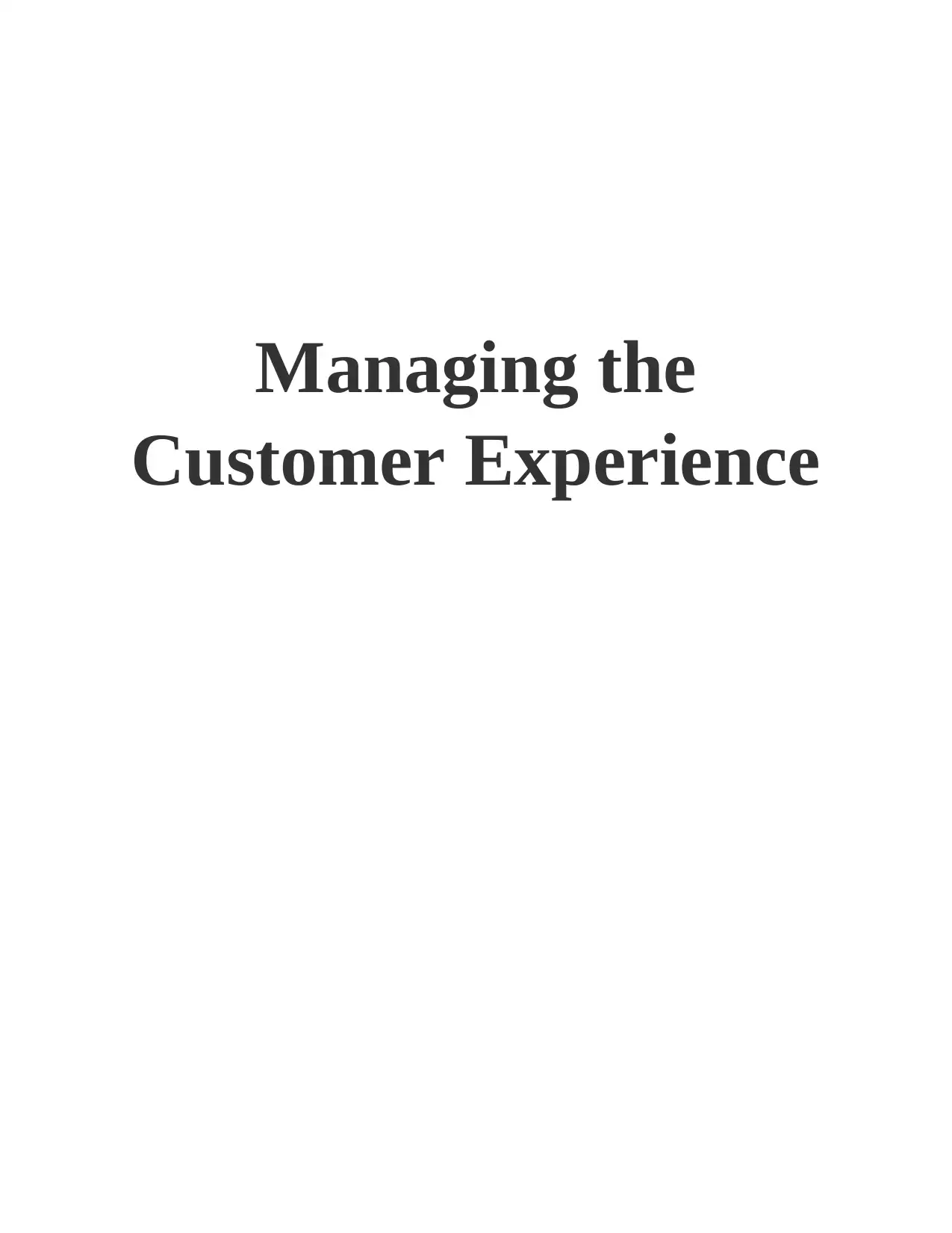
Managing the
Customer Experience
Customer Experience
Paraphrase This Document
Need a fresh take? Get an instant paraphrase of this document with our AI Paraphraser

Table of contents
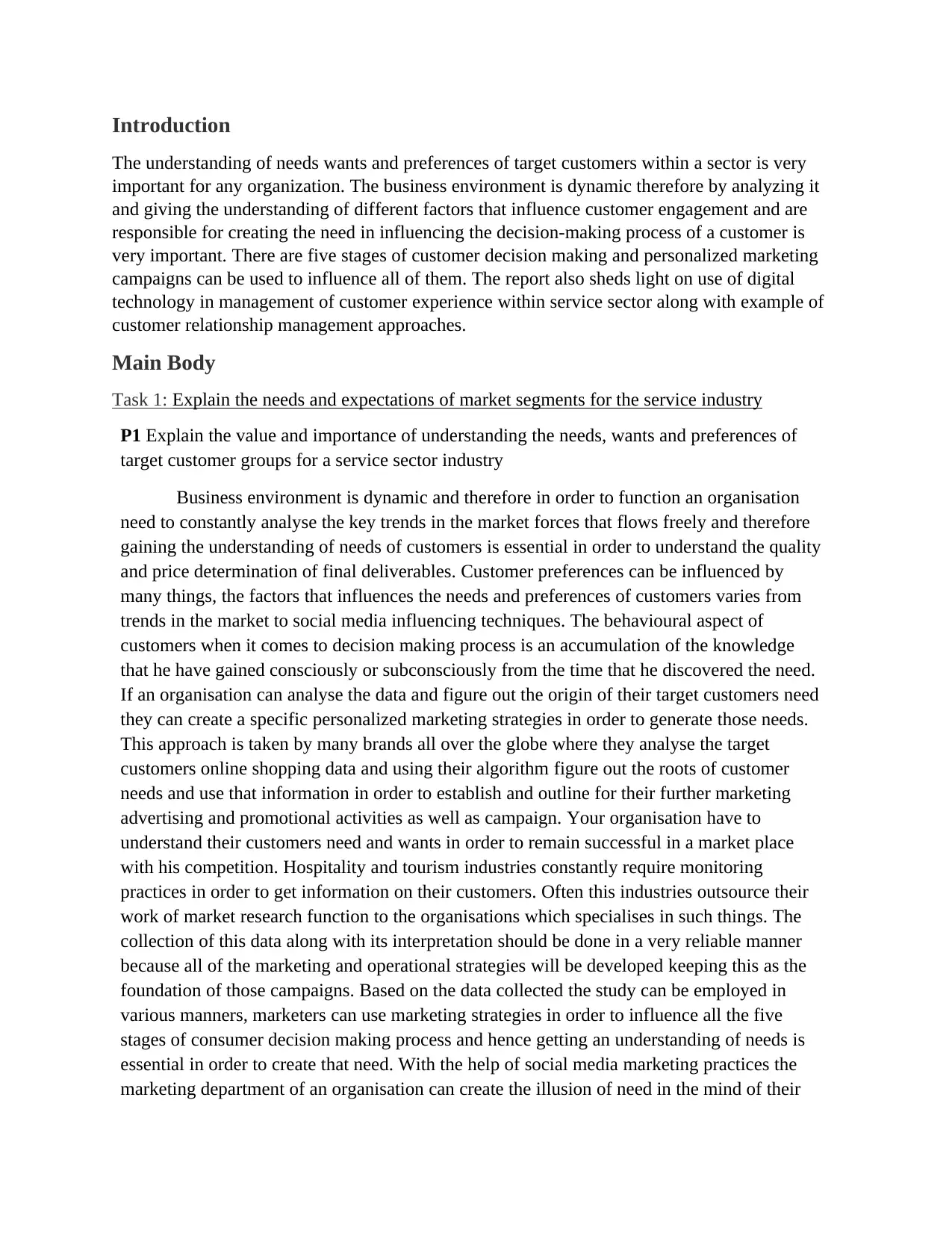
Introduction
The understanding of needs wants and preferences of target customers within a sector is very
important for any organization. The business environment is dynamic therefore by analyzing it
and giving the understanding of different factors that influence customer engagement and are
responsible for creating the need in influencing the decision-making process of a customer is
very important. There are five stages of customer decision making and personalized marketing
campaigns can be used to influence all of them. The report also sheds light on use of digital
technology in management of customer experience within service sector along with example of
customer relationship management approaches.
Main Body
Task 1: Explain the needs and expectations of market segments for the service industry
P1 Explain the value and importance of understanding the needs, wants and preferences of
target customer groups for a service sector industry
Business environment is dynamic and therefore in order to function an organisation
need to constantly analyse the key trends in the market forces that flows freely and therefore
gaining the understanding of needs of customers is essential in order to understand the quality
and price determination of final deliverables. Customer preferences can be influenced by
many things, the factors that influences the needs and preferences of customers varies from
trends in the market to social media influencing techniques. The behavioural aspect of
customers when it comes to decision making process is an accumulation of the knowledge
that he have gained consciously or subconsciously from the time that he discovered the need.
If an organisation can analyse the data and figure out the origin of their target customers need
they can create a specific personalized marketing strategies in order to generate those needs.
This approach is taken by many brands all over the globe where they analyse the target
customers online shopping data and using their algorithm figure out the roots of customer
needs and use that information in order to establish and outline for their further marketing
advertising and promotional activities as well as campaign. Your organisation have to
understand their customers need and wants in order to remain successful in a market place
with his competition. Hospitality and tourism industries constantly require monitoring
practices in order to get information on their customers. Often this industries outsource their
work of market research function to the organisations which specialises in such things. The
collection of this data along with its interpretation should be done in a very reliable manner
because all of the marketing and operational strategies will be developed keeping this as the
foundation of those campaigns. Based on the data collected the study can be employed in
various manners, marketers can use marketing strategies in order to influence all the five
stages of consumer decision making process and hence getting an understanding of needs is
essential in order to create that need. With the help of social media marketing practices the
marketing department of an organisation can create the illusion of need in the mind of their
The understanding of needs wants and preferences of target customers within a sector is very
important for any organization. The business environment is dynamic therefore by analyzing it
and giving the understanding of different factors that influence customer engagement and are
responsible for creating the need in influencing the decision-making process of a customer is
very important. There are five stages of customer decision making and personalized marketing
campaigns can be used to influence all of them. The report also sheds light on use of digital
technology in management of customer experience within service sector along with example of
customer relationship management approaches.
Main Body
Task 1: Explain the needs and expectations of market segments for the service industry
P1 Explain the value and importance of understanding the needs, wants and preferences of
target customer groups for a service sector industry
Business environment is dynamic and therefore in order to function an organisation
need to constantly analyse the key trends in the market forces that flows freely and therefore
gaining the understanding of needs of customers is essential in order to understand the quality
and price determination of final deliverables. Customer preferences can be influenced by
many things, the factors that influences the needs and preferences of customers varies from
trends in the market to social media influencing techniques. The behavioural aspect of
customers when it comes to decision making process is an accumulation of the knowledge
that he have gained consciously or subconsciously from the time that he discovered the need.
If an organisation can analyse the data and figure out the origin of their target customers need
they can create a specific personalized marketing strategies in order to generate those needs.
This approach is taken by many brands all over the globe where they analyse the target
customers online shopping data and using their algorithm figure out the roots of customer
needs and use that information in order to establish and outline for their further marketing
advertising and promotional activities as well as campaign. Your organisation have to
understand their customers need and wants in order to remain successful in a market place
with his competition. Hospitality and tourism industries constantly require monitoring
practices in order to get information on their customers. Often this industries outsource their
work of market research function to the organisations which specialises in such things. The
collection of this data along with its interpretation should be done in a very reliable manner
because all of the marketing and operational strategies will be developed keeping this as the
foundation of those campaigns. Based on the data collected the study can be employed in
various manners, marketers can use marketing strategies in order to influence all the five
stages of consumer decision making process and hence getting an understanding of needs is
essential in order to create that need. With the help of social media marketing practices the
marketing department of an organisation can create the illusion of need in the mind of their
⊘ This is a preview!⊘
Do you want full access?
Subscribe today to unlock all pages.

Trusted by 1+ million students worldwide
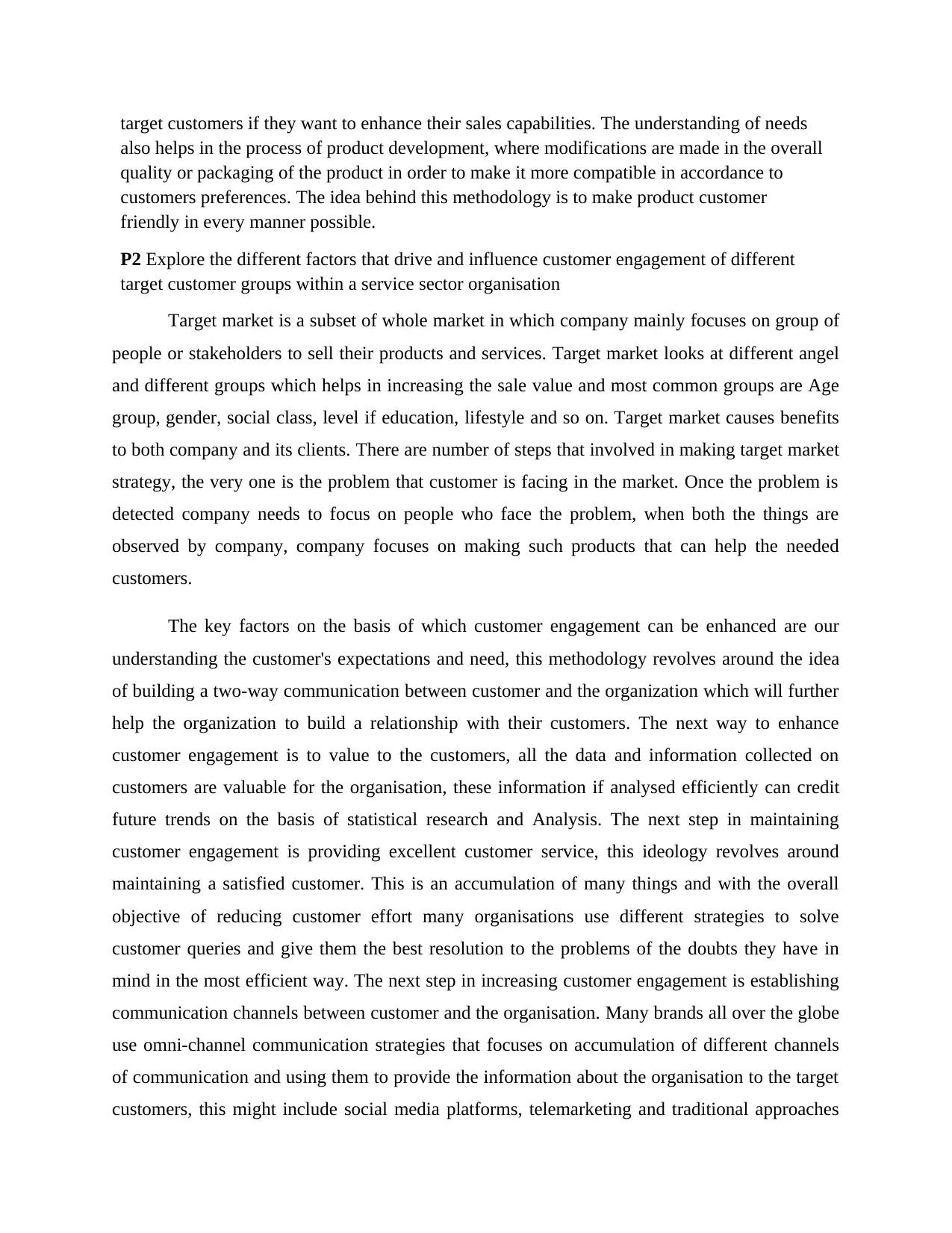
target customers if they want to enhance their sales capabilities. The understanding of needs
also helps in the process of product development, where modifications are made in the overall
quality or packaging of the product in order to make it more compatible in accordance to
customers preferences. The idea behind this methodology is to make product customer
friendly in every manner possible.
P2 Explore the different factors that drive and influence customer engagement of different
target customer groups within a service sector organisation
Target market is a subset of whole market in which company mainly focuses on group of
people or stakeholders to sell their products and services. Target market looks at different angel
and different groups which helps in increasing the sale value and most common groups are Age
group, gender, social class, level if education, lifestyle and so on. Target market causes benefits
to both company and its clients. There are number of steps that involved in making target market
strategy, the very one is the problem that customer is facing in the market. Once the problem is
detected company needs to focus on people who face the problem, when both the things are
observed by company, company focuses on making such products that can help the needed
customers.
The key factors on the basis of which customer engagement can be enhanced are our
understanding the customer's expectations and need, this methodology revolves around the idea
of building a two-way communication between customer and the organization which will further
help the organization to build a relationship with their customers. The next way to enhance
customer engagement is to value to the customers, all the data and information collected on
customers are valuable for the organisation, these information if analysed efficiently can credit
future trends on the basis of statistical research and Analysis. The next step in maintaining
customer engagement is providing excellent customer service, this ideology revolves around
maintaining a satisfied customer. This is an accumulation of many things and with the overall
objective of reducing customer effort many organisations use different strategies to solve
customer queries and give them the best resolution to the problems of the doubts they have in
mind in the most efficient way. The next step in increasing customer engagement is establishing
communication channels between customer and the organisation. Many brands all over the globe
use omni-channel communication strategies that focuses on accumulation of different channels
of communication and using them to provide the information about the organisation to the target
customers, this might include social media platforms, telemarketing and traditional approaches
also helps in the process of product development, where modifications are made in the overall
quality or packaging of the product in order to make it more compatible in accordance to
customers preferences. The idea behind this methodology is to make product customer
friendly in every manner possible.
P2 Explore the different factors that drive and influence customer engagement of different
target customer groups within a service sector organisation
Target market is a subset of whole market in which company mainly focuses on group of
people or stakeholders to sell their products and services. Target market looks at different angel
and different groups which helps in increasing the sale value and most common groups are Age
group, gender, social class, level if education, lifestyle and so on. Target market causes benefits
to both company and its clients. There are number of steps that involved in making target market
strategy, the very one is the problem that customer is facing in the market. Once the problem is
detected company needs to focus on people who face the problem, when both the things are
observed by company, company focuses on making such products that can help the needed
customers.
The key factors on the basis of which customer engagement can be enhanced are our
understanding the customer's expectations and need, this methodology revolves around the idea
of building a two-way communication between customer and the organization which will further
help the organization to build a relationship with their customers. The next way to enhance
customer engagement is to value to the customers, all the data and information collected on
customers are valuable for the organisation, these information if analysed efficiently can credit
future trends on the basis of statistical research and Analysis. The next step in maintaining
customer engagement is providing excellent customer service, this ideology revolves around
maintaining a satisfied customer. This is an accumulation of many things and with the overall
objective of reducing customer effort many organisations use different strategies to solve
customer queries and give them the best resolution to the problems of the doubts they have in
mind in the most efficient way. The next step in increasing customer engagement is establishing
communication channels between customer and the organisation. Many brands all over the globe
use omni-channel communication strategies that focuses on accumulation of different channels
of communication and using them to provide the information about the organisation to the target
customers, this might include social media platforms, telemarketing and traditional approaches
Paraphrase This Document
Need a fresh take? Get an instant paraphrase of this document with our AI Paraphraser
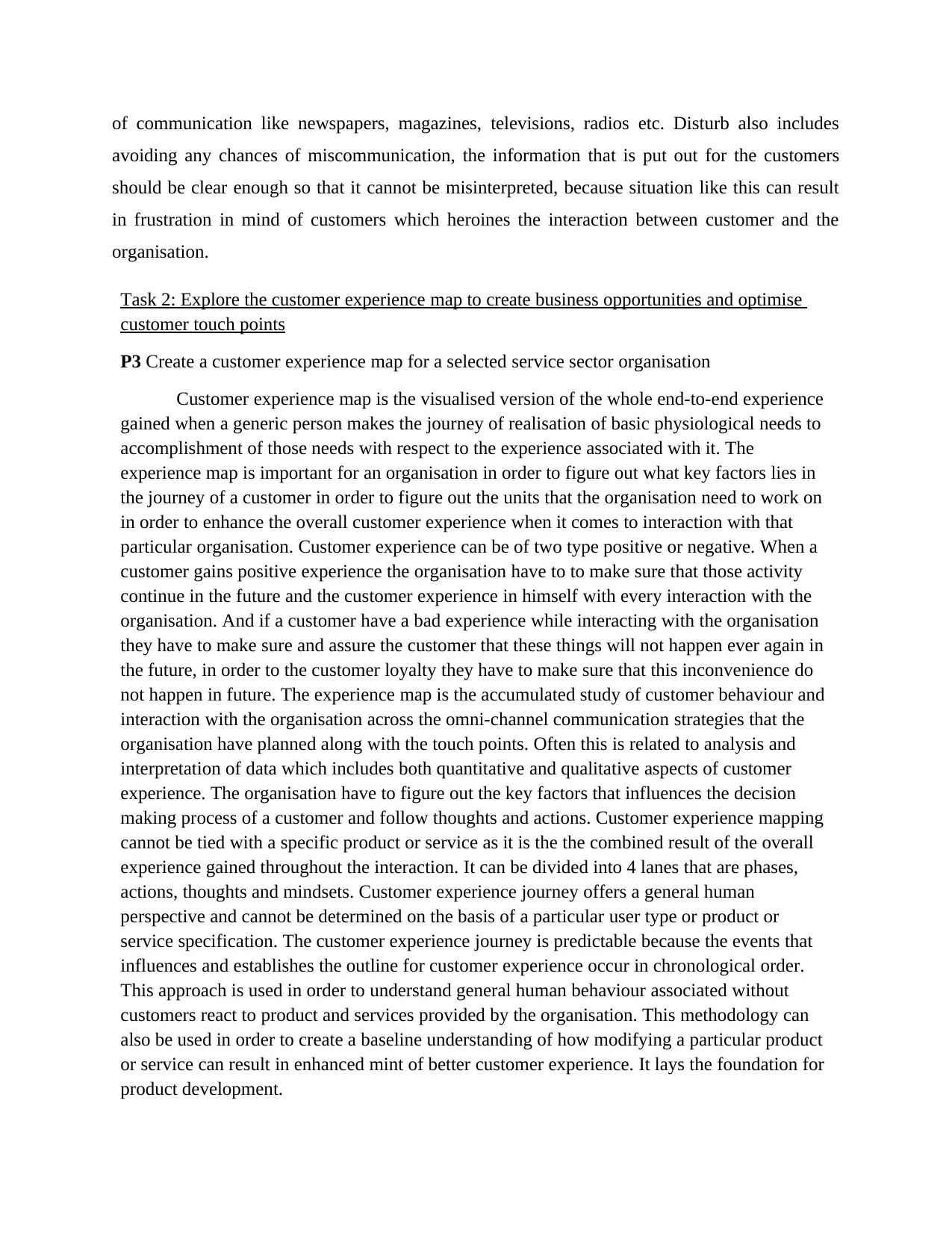
of communication like newspapers, magazines, televisions, radios etc. Disturb also includes
avoiding any chances of miscommunication, the information that is put out for the customers
should be clear enough so that it cannot be misinterpreted, because situation like this can result
in frustration in mind of customers which heroines the interaction between customer and the
organisation.
Task 2: Explore the customer experience map to create business opportunities and optimise
customer touch points
P3 Create a customer experience map for a selected service sector organisation
Customer experience map is the visualised version of the whole end-to-end experience
gained when a generic person makes the journey of realisation of basic physiological needs to
accomplishment of those needs with respect to the experience associated with it. The
experience map is important for an organisation in order to figure out what key factors lies in
the journey of a customer in order to figure out the units that the organisation need to work on
in order to enhance the overall customer experience when it comes to interaction with that
particular organisation. Customer experience can be of two type positive or negative. When a
customer gains positive experience the organisation have to to make sure that those activity
continue in the future and the customer experience in himself with every interaction with the
organisation. And if a customer have a bad experience while interacting with the organisation
they have to make sure and assure the customer that these things will not happen ever again in
the future, in order to the customer loyalty they have to make sure that this inconvenience do
not happen in future. The experience map is the accumulated study of customer behaviour and
interaction with the organisation across the omni-channel communication strategies that the
organisation have planned along with the touch points. Often this is related to analysis and
interpretation of data which includes both quantitative and qualitative aspects of customer
experience. The organisation have to figure out the key factors that influences the decision
making process of a customer and follow thoughts and actions. Customer experience mapping
cannot be tied with a specific product or service as it is the the combined result of the overall
experience gained throughout the interaction. It can be divided into 4 lanes that are phases,
actions, thoughts and mindsets. Customer experience journey offers a general human
perspective and cannot be determined on the basis of a particular user type or product or
service specification. The customer experience journey is predictable because the events that
influences and establishes the outline for customer experience occur in chronological order.
This approach is used in order to understand general human behaviour associated without
customers react to product and services provided by the organisation. This methodology can
also be used in order to create a baseline understanding of how modifying a particular product
or service can result in enhanced mint of better customer experience. It lays the foundation for
product development.
avoiding any chances of miscommunication, the information that is put out for the customers
should be clear enough so that it cannot be misinterpreted, because situation like this can result
in frustration in mind of customers which heroines the interaction between customer and the
organisation.
Task 2: Explore the customer experience map to create business opportunities and optimise
customer touch points
P3 Create a customer experience map for a selected service sector organisation
Customer experience map is the visualised version of the whole end-to-end experience
gained when a generic person makes the journey of realisation of basic physiological needs to
accomplishment of those needs with respect to the experience associated with it. The
experience map is important for an organisation in order to figure out what key factors lies in
the journey of a customer in order to figure out the units that the organisation need to work on
in order to enhance the overall customer experience when it comes to interaction with that
particular organisation. Customer experience can be of two type positive or negative. When a
customer gains positive experience the organisation have to to make sure that those activity
continue in the future and the customer experience in himself with every interaction with the
organisation. And if a customer have a bad experience while interacting with the organisation
they have to make sure and assure the customer that these things will not happen ever again in
the future, in order to the customer loyalty they have to make sure that this inconvenience do
not happen in future. The experience map is the accumulated study of customer behaviour and
interaction with the organisation across the omni-channel communication strategies that the
organisation have planned along with the touch points. Often this is related to analysis and
interpretation of data which includes both quantitative and qualitative aspects of customer
experience. The organisation have to figure out the key factors that influences the decision
making process of a customer and follow thoughts and actions. Customer experience mapping
cannot be tied with a specific product or service as it is the the combined result of the overall
experience gained throughout the interaction. It can be divided into 4 lanes that are phases,
actions, thoughts and mindsets. Customer experience journey offers a general human
perspective and cannot be determined on the basis of a particular user type or product or
service specification. The customer experience journey is predictable because the events that
influences and establishes the outline for customer experience occur in chronological order.
This approach is used in order to understand general human behaviour associated without
customers react to product and services provided by the organisation. This methodology can
also be used in order to create a baseline understanding of how modifying a particular product
or service can result in enhanced mint of better customer experience. It lays the foundation for
product development.
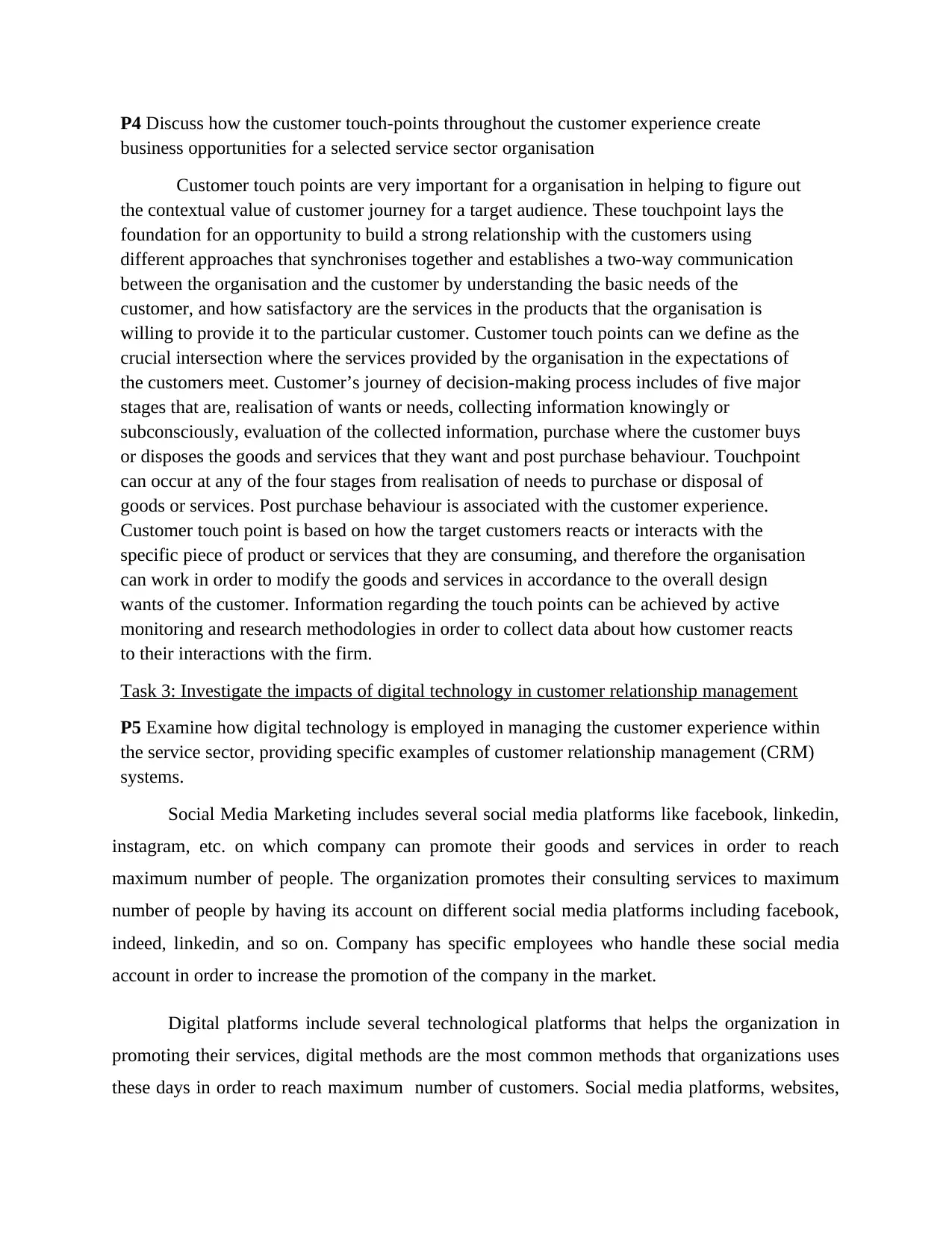
P4 Discuss how the customer touch-points throughout the customer experience create
business opportunities for a selected service sector organisation
Customer touch points are very important for a organisation in helping to figure out
the contextual value of customer journey for a target audience. These touchpoint lays the
foundation for an opportunity to build a strong relationship with the customers using
different approaches that synchronises together and establishes a two-way communication
between the organisation and the customer by understanding the basic needs of the
customer, and how satisfactory are the services in the products that the organisation is
willing to provide it to the particular customer. Customer touch points can we define as the
crucial intersection where the services provided by the organisation in the expectations of
the customers meet. Customer’s journey of decision-making process includes of five major
stages that are, realisation of wants or needs, collecting information knowingly or
subconsciously, evaluation of the collected information, purchase where the customer buys
or disposes the goods and services that they want and post purchase behaviour. Touchpoint
can occur at any of the four stages from realisation of needs to purchase or disposal of
goods or services. Post purchase behaviour is associated with the customer experience.
Customer touch point is based on how the target customers reacts or interacts with the
specific piece of product or services that they are consuming, and therefore the organisation
can work in order to modify the goods and services in accordance to the overall design
wants of the customer. Information regarding the touch points can be achieved by active
monitoring and research methodologies in order to collect data about how customer reacts
to their interactions with the firm.
Task 3: Investigate the impacts of digital technology in customer relationship management
P5 Examine how digital technology is employed in managing the customer experience within
the service sector, providing specific examples of customer relationship management (CRM)
systems.
Social Media Marketing includes several social media platforms like facebook, linkedin,
instagram, etc. on which company can promote their goods and services in order to reach
maximum number of people. The organization promotes their consulting services to maximum
number of people by having its account on different social media platforms including facebook,
indeed, linkedin, and so on. Company has specific employees who handle these social media
account in order to increase the promotion of the company in the market.
Digital platforms include several technological platforms that helps the organization in
promoting their services, digital methods are the most common methods that organizations uses
these days in order to reach maximum number of customers. Social media platforms, websites,
business opportunities for a selected service sector organisation
Customer touch points are very important for a organisation in helping to figure out
the contextual value of customer journey for a target audience. These touchpoint lays the
foundation for an opportunity to build a strong relationship with the customers using
different approaches that synchronises together and establishes a two-way communication
between the organisation and the customer by understanding the basic needs of the
customer, and how satisfactory are the services in the products that the organisation is
willing to provide it to the particular customer. Customer touch points can we define as the
crucial intersection where the services provided by the organisation in the expectations of
the customers meet. Customer’s journey of decision-making process includes of five major
stages that are, realisation of wants or needs, collecting information knowingly or
subconsciously, evaluation of the collected information, purchase where the customer buys
or disposes the goods and services that they want and post purchase behaviour. Touchpoint
can occur at any of the four stages from realisation of needs to purchase or disposal of
goods or services. Post purchase behaviour is associated with the customer experience.
Customer touch point is based on how the target customers reacts or interacts with the
specific piece of product or services that they are consuming, and therefore the organisation
can work in order to modify the goods and services in accordance to the overall design
wants of the customer. Information regarding the touch points can be achieved by active
monitoring and research methodologies in order to collect data about how customer reacts
to their interactions with the firm.
Task 3: Investigate the impacts of digital technology in customer relationship management
P5 Examine how digital technology is employed in managing the customer experience within
the service sector, providing specific examples of customer relationship management (CRM)
systems.
Social Media Marketing includes several social media platforms like facebook, linkedin,
instagram, etc. on which company can promote their goods and services in order to reach
maximum number of people. The organization promotes their consulting services to maximum
number of people by having its account on different social media platforms including facebook,
indeed, linkedin, and so on. Company has specific employees who handle these social media
account in order to increase the promotion of the company in the market.
Digital platforms include several technological platforms that helps the organization in
promoting their services, digital methods are the most common methods that organizations uses
these days in order to reach maximum number of customers. Social media platforms, websites,
⊘ This is a preview!⊘
Do you want full access?
Subscribe today to unlock all pages.

Trusted by 1+ million students worldwide
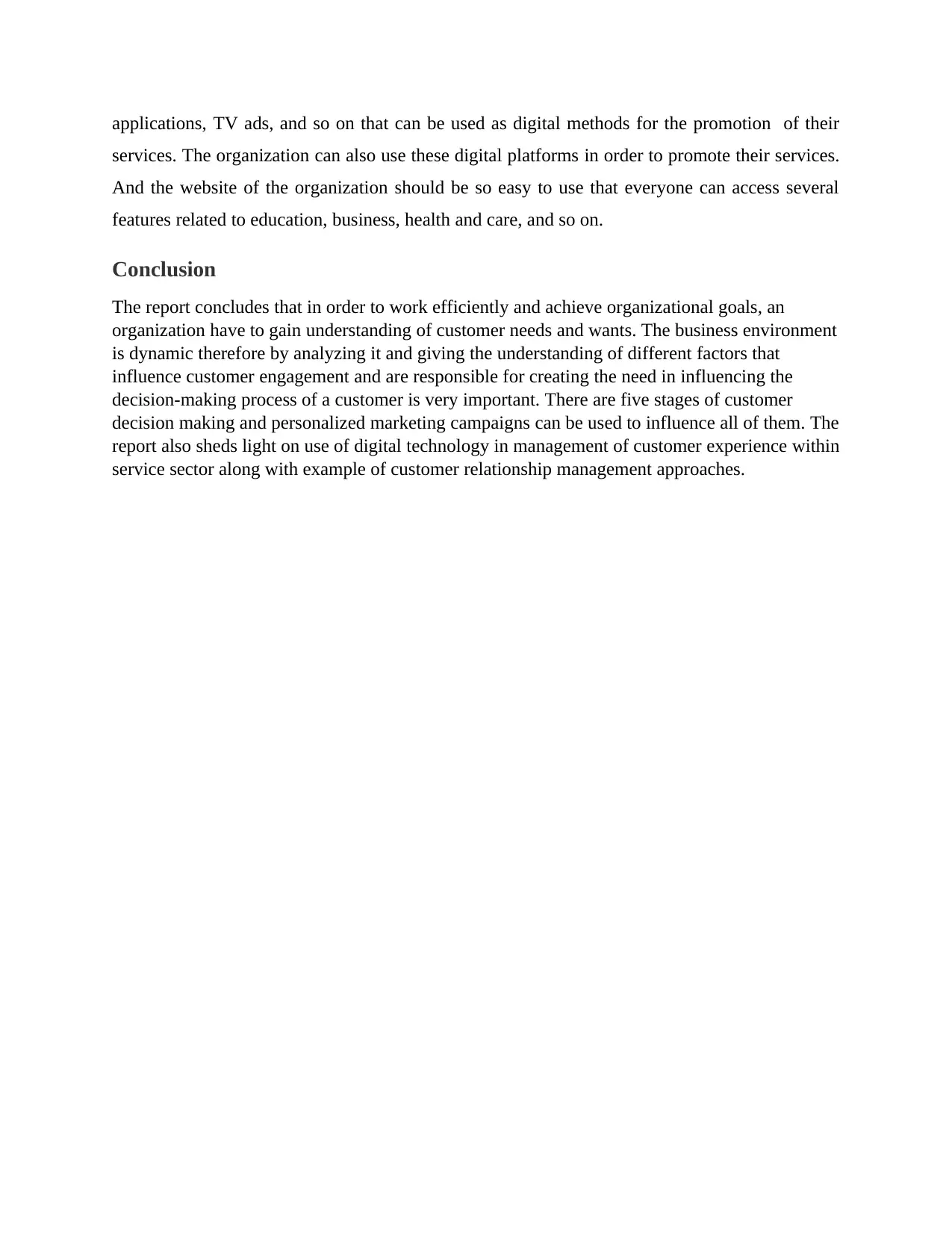
applications, TV ads, and so on that can be used as digital methods for the promotion of their
services. The organization can also use these digital platforms in order to promote their services.
And the website of the organization should be so easy to use that everyone can access several
features related to education, business, health and care, and so on.
Conclusion
The report concludes that in order to work efficiently and achieve organizational goals, an
organization have to gain understanding of customer needs and wants. The business environment
is dynamic therefore by analyzing it and giving the understanding of different factors that
influence customer engagement and are responsible for creating the need in influencing the
decision-making process of a customer is very important. There are five stages of customer
decision making and personalized marketing campaigns can be used to influence all of them. The
report also sheds light on use of digital technology in management of customer experience within
service sector along with example of customer relationship management approaches.
services. The organization can also use these digital platforms in order to promote their services.
And the website of the organization should be so easy to use that everyone can access several
features related to education, business, health and care, and so on.
Conclusion
The report concludes that in order to work efficiently and achieve organizational goals, an
organization have to gain understanding of customer needs and wants. The business environment
is dynamic therefore by analyzing it and giving the understanding of different factors that
influence customer engagement and are responsible for creating the need in influencing the
decision-making process of a customer is very important. There are five stages of customer
decision making and personalized marketing campaigns can be used to influence all of them. The
report also sheds light on use of digital technology in management of customer experience within
service sector along with example of customer relationship management approaches.
Paraphrase This Document
Need a fresh take? Get an instant paraphrase of this document with our AI Paraphraser
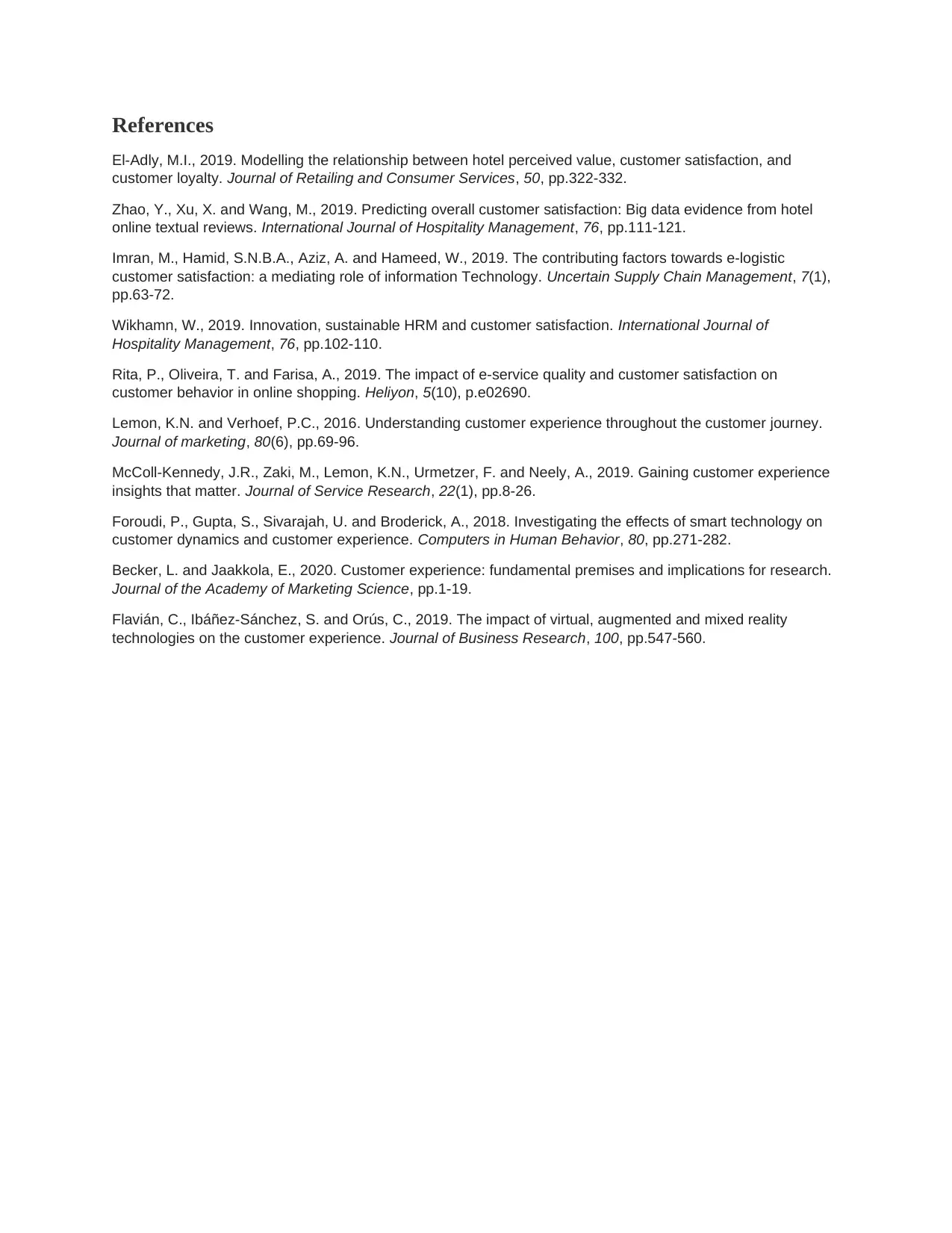
References
El-Adly, M.I., 2019. Modelling the relationship between hotel perceived value, customer satisfaction, and
customer loyalty. Journal of Retailing and Consumer Services, 50, pp.322-332.
Zhao, Y., Xu, X. and Wang, M., 2019. Predicting overall customer satisfaction: Big data evidence from hotel
online textual reviews. International Journal of Hospitality Management, 76, pp.111-121.
Imran, M., Hamid, S.N.B.A., Aziz, A. and Hameed, W., 2019. The contributing factors towards e-logistic
customer satisfaction: a mediating role of information Technology. Uncertain Supply Chain Management, 7(1),
pp.63-72.
Wikhamn, W., 2019. Innovation, sustainable HRM and customer satisfaction. International Journal of
Hospitality Management, 76, pp.102-110.
Rita, P., Oliveira, T. and Farisa, A., 2019. The impact of e-service quality and customer satisfaction on
customer behavior in online shopping. Heliyon, 5(10), p.e02690.
Lemon, K.N. and Verhoef, P.C., 2016. Understanding customer experience throughout the customer journey.
Journal of marketing, 80(6), pp.69-96.
McColl-Kennedy, J.R., Zaki, M., Lemon, K.N., Urmetzer, F. and Neely, A., 2019. Gaining customer experience
insights that matter. Journal of Service Research, 22(1), pp.8-26.
Foroudi, P., Gupta, S., Sivarajah, U. and Broderick, A., 2018. Investigating the effects of smart technology on
customer dynamics and customer experience. Computers in Human Behavior, 80, pp.271-282.
Becker, L. and Jaakkola, E., 2020. Customer experience: fundamental premises and implications for research.
Journal of the Academy of Marketing Science, pp.1-19.
Flavián, C., Ibáñez-Sánchez, S. and Orús, C., 2019. The impact of virtual, augmented and mixed reality
technologies on the customer experience. Journal of Business Research, 100, pp.547-560.
El-Adly, M.I., 2019. Modelling the relationship between hotel perceived value, customer satisfaction, and
customer loyalty. Journal of Retailing and Consumer Services, 50, pp.322-332.
Zhao, Y., Xu, X. and Wang, M., 2019. Predicting overall customer satisfaction: Big data evidence from hotel
online textual reviews. International Journal of Hospitality Management, 76, pp.111-121.
Imran, M., Hamid, S.N.B.A., Aziz, A. and Hameed, W., 2019. The contributing factors towards e-logistic
customer satisfaction: a mediating role of information Technology. Uncertain Supply Chain Management, 7(1),
pp.63-72.
Wikhamn, W., 2019. Innovation, sustainable HRM and customer satisfaction. International Journal of
Hospitality Management, 76, pp.102-110.
Rita, P., Oliveira, T. and Farisa, A., 2019. The impact of e-service quality and customer satisfaction on
customer behavior in online shopping. Heliyon, 5(10), p.e02690.
Lemon, K.N. and Verhoef, P.C., 2016. Understanding customer experience throughout the customer journey.
Journal of marketing, 80(6), pp.69-96.
McColl-Kennedy, J.R., Zaki, M., Lemon, K.N., Urmetzer, F. and Neely, A., 2019. Gaining customer experience
insights that matter. Journal of Service Research, 22(1), pp.8-26.
Foroudi, P., Gupta, S., Sivarajah, U. and Broderick, A., 2018. Investigating the effects of smart technology on
customer dynamics and customer experience. Computers in Human Behavior, 80, pp.271-282.
Becker, L. and Jaakkola, E., 2020. Customer experience: fundamental premises and implications for research.
Journal of the Academy of Marketing Science, pp.1-19.
Flavián, C., Ibáñez-Sánchez, S. and Orús, C., 2019. The impact of virtual, augmented and mixed reality
technologies on the customer experience. Journal of Business Research, 100, pp.547-560.
1 out of 8
Related Documents
Your All-in-One AI-Powered Toolkit for Academic Success.
+13062052269
info@desklib.com
Available 24*7 on WhatsApp / Email
![[object Object]](/_next/static/media/star-bottom.7253800d.svg)
Unlock your academic potential
Copyright © 2020–2026 A2Z Services. All Rights Reserved. Developed and managed by ZUCOL.





